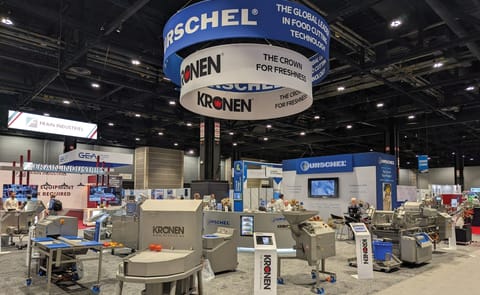Storing potatoes long-term: ambient (outside air) vs refrigeration
Storing potatoes long-term: ambient (outside air) vs refrigeration

Storing potatoes long-term is challenging, especially so if you rely on ambient (only outside-air) ventilation. In the UK it is seldom possible to hold crops at optimum temperature in ambient stores beyond early May. Can refrigeration help?
The availability of sufficient cold air at night-time is usually a constraint in ambient stores; this is exacerbated in any stores where there is no automated (thermostatic) control available as it restricts the chance to grab even short periods of cold, night air to keep temperatures close to set point.
With increasing pressure on ambient systems both in the autumn pull-down period and springtime due to limited cold air availability, the issue is now being compounded by the need to limit air exchange in stores to help retain volatile chemicals within the building for sprout control. So the logical solution, although not necessarily a simple one, is to invest in refrigeration.
New refrigeration system: which option should I go for?
Refrigeration will cut down on the need to change the air in the store (notwithstanding the need to flush stores in some circumstances) and will provide on-demand cooling for the store so it can always be kept at the optimum temperature required.
Straightforward direct expansion (DX) refrigeration remains an option albeit with the knowledge that long pipe runs and large coils require a lot of expensive refrigerants. Alternatively, some growers are opting for indirect, glycol-based cooling which uses water/glycol mixtures to remove the heat from the store.
Glycol can also be a good solution if there is an opportunity to combine cooling of the potato store with other enterprises on-site such as the use of waste heat for warming a grading area, for example.
What if I already have a refrigeration system?
For those with refrigeration systems already installed, make sure that the system is serviced regularly, has a full refrigerant charge, and that the system is compliant with F-gas regulations – you may wish to ask your refrigeration service engineer for help with this or search 'F-gas regs'.
Replace banned gases with a 'drop-in' replacement and try to plan to move away from gases that are now on quota (R404A is the most commonly used in potato stores) as leaks will be difficult to repair and replacement gas will become more and more expensive as quotas reduce.
Don't forget to check coil condition too – both in the evaporator (in the store) and the condenser (outside). Clean, unobstructed coils will transfer heat most efficiently.










